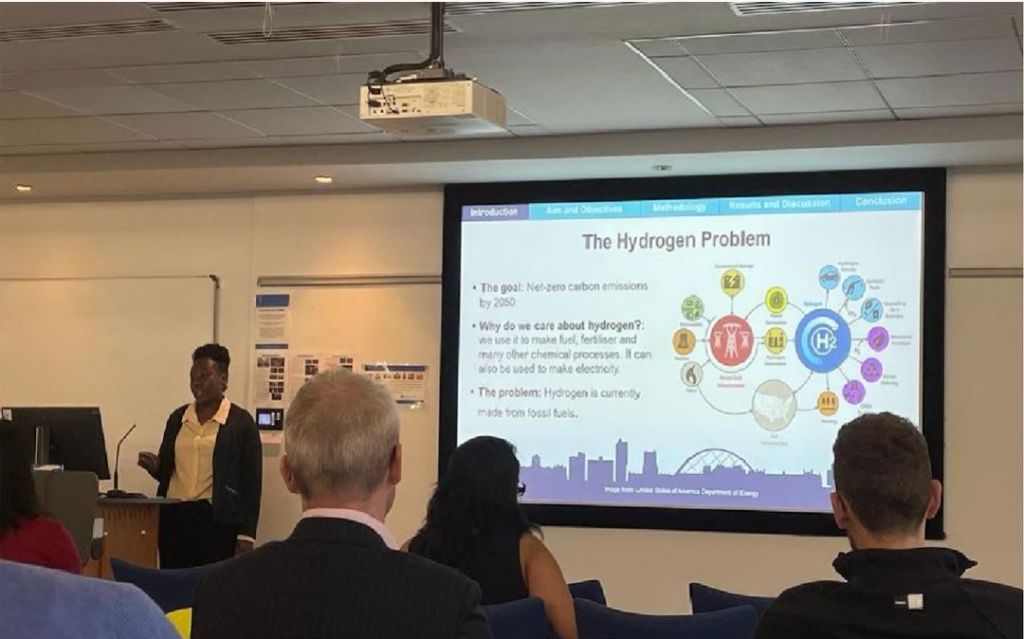
A Summer Abroad: The PhD Journey
My research focuses on assisting the UK to reach net-zero carbon by 2050. One of the ways to achieve this is to produce hydrogen from electrolysis. The majority (>95%) of hydrogen is currently generated from fossil fuels which releases carbon dioxide. Therefore, researchers like myself use an electrochemical device known as an electrolyser to produce both hydrogen and oxygen using electrolysis.
This technology is also known as water splitting – splitting water into hydrogen and oxygen using electricity. However, the current materials required for such a device to work (iridium and platinum) are scarce and expensive. This is where my groups’ research becomes relevant.
Our aim is to drastically reduce the amount of irdium necessary in electrolysers. I focus on developing extremely small materials called nanopowders, that contain a reduced amount of the expensive iridium but can still achieve the same level of performance as commercial materials. We test our materials using equipment called rotating disk electrode shown in the image below. This simplified set-up is a quick and relatively inexpensive method to test new materials for electrolysis.
A part of being a PhD student involves communicating your research to a wider audience. This involves giving talks and presenting posters to colleagues in our specific scientific field and the general audience. Throughout my PhD, I have been able to attend conferences both online and in-person and was able to see the extent of ongoing research within my field around the UK and in the world. This summer I had the pleasure of presenting in two conferences in two countries that I’d never visited before!

In June 2022 I presented an oral presentation at H2FCSupergen in St. Andrews, Scotland. H2FCSupergen is a UK government funded programme to address key issues within the hydrogen production and usage sector.
Then, in July 2022, I travelled to Bryant University for the Gordon Research Conference (GRC) in Rhode Island, USA. GRC conferences assemble international scientists to present their unpublished cutting-edge research via oral and poster presentations. The conference I attended was specifically for researchers working in fuel cells and hydrogen technologies. This conference is very prestigious and only selects 200 attendees per conference and is held only every other year.
Both conferences that I participated in this year were attended by PhD students, postgraduate researchers and representatives of hydrogen technology companies around the world, making it the perfect places to showcase my research.

It is often difficult as a PhD student to meet people within your own university that do similar research. Thus, as PhD students, when we participate in these conferences, we also get the opportunity to discuss our research, career and managerial aspects with like-minded people. Although attending and presenting at conferences may be daunting for some (my heart rate shot up to 104 bpm just before I was about to present at H2FCSupergen!) It allows you to learn from others, create connections with members of the community in your field leading to collaborations (on rare occasion even job interviews) and gives people the opportunity to view your work. Often such outsider’s perspectives can be a valuable resource.
Personally, these two conferences in 2022 have given me a sense of belonging. Finding someone who works on hydrogen production with a focus on material development of iridium based nanopowders within Manchester Metropolitan University is rare (at least it is for me!). Therefore, attending conferences is an invaluable chance to discuss my work with others. It is also a chance to learn from other PhD students and PhD graduates within my field who are at various stages of their research. If I could offer one tip about conferences, it is: fight the fear and do it anyway! You have nothing to lose and everything to gain by attending and presenting your work.
If you want to find more about Debora and her groups’ work, follow @BelamiDebora and @KingRegmiLab on twitter.


